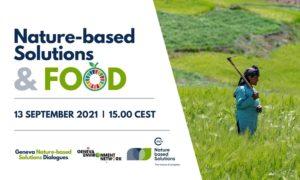Événement Virtuel
Nature-based Solutions and Food | Geneva Nature-based Solutions Dialogues
The Geneva Nature-based Solutions dialogues aim to facilitate further engagement and discussion among the stakeholders in International Geneva and beyond, in the lead-up to a critical year for nature and society. The dialogues are convened by the Geneva Environment Network and the International Union for Conservation of Nature (IUCN).
About the Dialogues
We are facing a triple planetary crisis – climate change, nature loss and pollution. In this context, Nature-based Solutions (NbS) are a powerful ally to address a societal and environmental challenges. As per IUCN definition, NbS are actions to protect, sustainably manage and restore natural or modified ecosystems that address societal challenges effectively and adaptively, simultaneously providing human well-being and biodiversity benefits.
NbS are a powerful tool to facilitate and catalyse the engagement of cross-sectoral stakeholders to join forces towards the implementation of an ambitious Post-2020 Global Biodiversity Framework (GBF) and move towards achieving the CBD 2050 Vision of ‘Living in harmony with nature’. NbS also offer a pathway for synergies among several multilateral environmental agreements, including for biological diversity (CBD), climate change (UNFCCC), disaster risk reduction (Sendai Framework), desertification (UNCCD) and the wider Sustainable Development Goals (SDGs) – and for mainstreaming nature conservation into sectoral decision-making processes.
In the lead-up to a critical year for nature and society, NbS offer an opportunity to address a wide range of urgent societal challenges. The year 2021 and the major upcoming negotiations should indeed mark a turning point towards a resilient world for future generations.
Join the Geneva Environment Network and the International Union for Conservation of Nature in a one-year journey, where experts from all over the world and different sectors will discuss throughout the year how NbS are relevant to various debates ongoing in Geneva.
About this Session
The Nature-based Solutions and Food Dialogue is the fifth of a journey convened by GEN & IUCN in the run-up to various international negotiations. It is organized ahead of the UN Food Systems Summit to be held during the UN General Assembly on 23 September 2021.
Nature-based Solutions (NbS) are designed to improve the ecosystem services provided by nature. When deployed properly, NbS can deliver multiple benefits, from supporting agricultural production and resilience, to mitigating climate change, enhancing nature and biodiversity, and providing hydrological services. Farming practices that increase soil biodiversity include sustainably managing soil water and nutrients, controlling erosion, and maintaining groundcover.
Food production has a massive impact on our planet. Moreover, looking forward, global food production needs are expected to increase more than 40% by 2030 and 70% by 2050, compared to average 2005-07 levels (OECD and FAO, 2018). With more than half of Earth’s habitable lands currently used for agriculture (Ritchie, 2019), farmers and food producers play an important role in maintaining and conserving biodiversity. The loss of healthy soils reduces agricultural yields and could result in a food production shortfall of 25% by 2050. It is estimated that increasing soil biodiversity could contribute up to 2.3 billion tonnes of additional crop production per year, valued at US$1.4 trillion (IUCN, 2020).
Therefore, it is now time to join forces and take action to meet the increasing demand on the food system while halting further land degradation. Leading experts at this session will discuss why NbS represent a key pathway for achieving this goal while contributing to established international and global targets. Adopting NbS approaches to better our food systems is essential to meeting the fundamental human right to food and contribute to multiple imperatives of the 2030 Sustainable Development Agenda.
Sessions
- Nature-based Solutions and Health | 26 April
- Nature-based Solutions and Ecosystems Restoration | 7 June
- Nature-based Solutions and the Post-2020 Biodiversity Framework | 28 June
- Decent Work Through Nature-based Solution for an Inclusive Socio-Economic Recovery | 30 August
- Nature-based Solutions and Oceans | 27 September
- Nature-based Solutions for Building Resilience | 11 October
- Nature-based Solutions and Cities | 25 October
- Nature-based Solutions and Peacebuilding | 1 November
- Nature-based Solutions and Water | 22 November
- Nature-based Solutions and People | 6 December
Speakers
By order of intervention.

Jonathan DAVIES
Senior Agriculture Adviser, IUCN

James LOMAX
Food Systems and Agriculture Adviser, UNEP & Secondee to UN Food Systems Summit

Frank EYHORN
CEO, Biovision

Allan NDAGIJE
Focal Point for Environment and Agriculture, Permanent Mission of Uganda to UN Geneva

Femy PINTO
Executive Director, Non-Timber Forest Products Exchange Programme
Nature-based Solutions Champion

Marie-Claire GRAF
Focal Point of YOUNGO, UN Climate Change and Vice Chair Youth, UN Food System Summit
Summary
Setting the Scene
Jonathan DAVIES | Senior Agriculture Adviser, IUCN
- One of the headline messages from the IUCN Congress in Marseille was the growing acceptance that we have to seriously discuss behavioral change and our consumption, such as food consumption, to tackle environmental challenges.
- We’re also dealing with a complex system change when we connect the food and agricultural sector. Agriculture and land-use management are particularly relevant in nature-based solutions.
- Agriculture fundamentally depends on nature for soil fertility, soil moisture, pollination, and other factors. But agriculture has also contributed to degrading nature, stressing pollinators, for example. But new approaches such as agroecological resources and regenerative farming revive soil biodiversity and land health. In doing so, they improve soil moisture, soil fertility and protect habitat on the farms and surrounding landscapes.
- We’re bringing together actors from the conservation and agricultural sectors to see where we can make rapid progress and how farmers can benefit from sustainable agriculture that translates to real income. We also want to ensure that the move to sustainable agriculture promotes a just transition, especially in countries were food security is still a challenge.
Mainstraiming Nature-based Solutions in Food Systems
James LOMAX | Food Systems and Agriculture Adviser, UNEP, Secondee to UN Food Systems Summit
- The UN Food Systems Summit is scheduled on 23 September 2021 where we have an incredible opportunity for governments, UN agencies, NGOs and other stakeholders to get involved in the dialogue and discussion on food systems.
- By taking a food systems approach, the acceleration to achieving the SDGs in 2030 could be much higher. The barrier in the past has been with countries and silos. But food systems are interrelated and we now have an opportunity where more than 150 countries have agreed to have a food systems summit dialogue. In addition, more than 50 countries will be presenting at the summit and confirming that they’ll take the sustainable food systems pathways forward. We have a real opportunity to go from a normative and high-level discussion to detailed country-level plans.
- Nature and nature-based solutions are mainstreamed in the summit. The Secretary-General will also call on three areas for people, prosperity and planet.
- Food systems are interrelated. But from the 1950s, we have seen a consolidation of seed producers, a change in dynamics and industries evolving around that particular food system which has pushed the behavior of consumers and producers.
Frank EYHORN | CEO, Biovision
- We have to look at the food system as a whole and not solely on productivity and diets.
- Within the UN Food Systems Summit, Biovision participated in Action Track 3 on nature-positive solutions together with other stakeholders such as scientists, NGOs, the private sector and governments. We looked at propositions from around the world, around 375 proposals, related to nature-positive production, which were divided into three sections:
- Protect: Deforestation-free and conversion-free food supply chains, land-freshwater nexus and repurposing Public Support to Food and Agriculture
- Manage: Transformation through innovation for nature-positive production, sustainable livestock, transformation through agroecology and regenerative agriculture, agrobiodiversity, aquatic and blue foods, and indigenous peoples’ food production systems
- Restore: Grasslands and savannahs, monitoring and stakeholder engagement with evidence, and global soil hub.
- Nature-based solutions are key and agroecology transforms food systems for people and planet. Diversity is key not only in terms of biodiversity but also economic diversity and soil health. Agroecology is a way to transition from either from subsistence or industrial agriculture to a diversified farming system, which allows biodiversity to thrive. A coalition has now been built to work together on research, funding and policies.
- An example of nature-based solutions is the push-pull technology in East Africa that we helped develop with local scientists and farmers. The effect is non-chemical crop protection, effective weed suppression, enhanced soil fertility, increased yields, fodder production and increased income.
Allan NDAGIJE | Focal Point for Environment and Agriculture, Permanent Mission of Uganda to UN Geneva
- Agriculture contributed to 24.03% of Uganda’s GDP in 2020 and remains the major source of livelihood in the country. The agricultural sector also accounted for the largest share of employment (36%) in Uganda and agriculture provides forward linkages (raw materials) and backward linkages (agricultural inputs) to the industrial sector that accounts for 26% of the GDP.
- According to Ester Kovandova and Martin Fowler (2019), agro-processing is an important opportunity for inclusive economic transformation and the biggest lever of inclusive economic development and poverty alleviation in Uganda as it employs more than two-thirds of Uganda’s labor force, most of whom are engaged in (near-) subsistence farming. The rural areas where farming is the predominant economic activity are currently home to almost 90% of Uganda’s poor and would benefit greatly from agro-processing industries. The two authors further state that agro-processing represents one of the most promising avenues for job creation and structural transformation in Uganda as agro-processing firms have a strong incentive to integrate smallholders into their value chains, providing them with access to inputs, skills, post-harvest handling and secure markets to increase their productivity. Furthermore, the increased demand for agricultural produce has the potential to drive up smallholder farmer revenues. Moreover, the authors continue to state that higher farm revenues, in turn, tend to generate greater rural demand for non-farm products, opening up business opportunities for rural populations and stimulating broader rural development.
- Both the government and development partners have identified agro-processing as an important sector for inclusive development in Uganda. Agriculture that is nature-dependent has the potentials for contributing sustainable development outcomes and acceleration of transformative socio-economic changes for human well-being in Uganda. Accordingly improved agricultural productivity and production gas the potentials of enhancing the following people-focused (society well-being) SDGs for socio-economic transformative changes:
- Poverty reduction through income generation and employment opportunities (SDG 1);
- Food security and nutrition health for improved quality of life (SDGs 2 and 3);
- Education opportunities through research, school curricula and university programs in agricultural sciences and extension services (SDG 4); and
- Gender equality by increasing income and job creation opportunities and thus enhancing equity between women and men (SDG 5)
- Ecosystems are natural capital for agriculture for socio-economic transformation of Uganda and must be conserved through nature-based solutions and actions that include protection, restoration and sustainable land management practices.
Femy PINTO | Executive Director, Non-Timber Forest Products Exchange Programme
- In Southeast Asia, an estimate of at least 15 million hectares are effectively conserved and managed by indigenous peoples and local communities largely through their traditional sustainable conservation measures and practices and customary governance and resource management systems to secure their food, harvest, gather, cultivate, plant, preserve, protect and conserve within their territories, ancestral domains and customary forested landscapes. By customary systems this includes their various indigenous food ways including rotational farming, hunting-gathering, fishing, trapping, food gardens and domestication. Some of these traditional systems focus on non-mainstream crops.
- Indigenous rights, their knowledge, systems and practices need to be central to nature-based solutions. Knowledge, awareness, and inclusion of these in the development, study and resourcing of nature based solutions and sustainable agricultural models are critical towards the future, if not only for the effective maintenance and protection of the significant area that they already currently hold and manage but also could provide strong application and replication value to other intact and productive landscapes.
- Tenure will bring back the integrity of forests and the integrity of food systems that has a strong foundation around the vibrancy and dynamism of indigenous food systems. That of the 6000 plus plants cultivated for food, fewer than 200 contribute to the global food output.
- Exploring wild foods and wild foods systems as vital indigenous knowledge-based solutions to food security, livelihood and biodiversity matter. Harvesting and utilizing wild foods requires knowledge on identification of plant and animal foods. These are often passed down across generations in both active and passive ways. But there are currently many facets to the challenges around wild foods availability including fundamentally tenure security and recognition; the continuity of inter-generational knowledge; the double edged sword of rejuvenation of food vs. exploitation and commercialization; deforestation, forest degradation, use of chemicals, extractive industries and monocultures.
- In the discourse about Nature-based Solutions, food systems and sustainable agriculture, we should consider the enhancement, protection and restoration of indigenous food ways.
- Other actions and perspectives to be considered in nature based solutions:
- Awareness-building and knowledge transfers, support community seed banking, rotational farming, observance of fallow periods, and guided fallows have the potential to improve forest quality; establish community-managed fish hatcheries and forest gardens; pursue multiple-use strategies and community-based management plans that are environmentally-sound and food-focused ; included here are works in the development and documentation of harvest Protocols and include also species augmentation through nurseries – with focus on food accompanied by supporting tools for harvest.
Championing Nature-based Solutions
Marie-Claire GRAF | Focal Point of YOUNGO, UN Climate Change and Vice Chair Youth, UN Food System Summit
- The youth network is increasingly talking about nature-based solutions, particularly in the context of climate change. However, there is still a lack of youth engagement on NbS and implement farming practices, especially as it’s not an attractive profession for the youth. The youth is not at the forefront in decision-making but we have been working on a position on NbS. We encourage you to engage the youth in the process and to learn and gain knowledge from the experts.
Video
In addition to the live WebEx and Facebook transmissions, the video is available on this webpage.
Documents
Links
- What are Nature-based Solutions (NbS)? | Infographic | IUCN
- IUCN Global Standard for Nature-based Solutions: First Edition | IUCN | 2020
- Nature-based Solution for Food and Human Health | UNFCCC
- Forest restoration solutions to transform food systems | UN-REDD
- Agroecology Info Pool | An initiative by Biovision
- Linking Wild Foods, Biodiversity and Forest based Livelihoods: Towards an Outlook of Inclusive Foods Systems in Asia to 2030 | NTFP-EP & SIANI
- NbS Youth Position | Global Youth Biodiversity Network, YOUNGO, and Youth4Nature
- Landscapes for People, Food and Nature
- UN report calls for repurposing of USD 470 billion of agricultural support that distorts prices and steer us away from environment and social goals | FAO, UNDP, UNEP | 14 September 2021
- High-Level Report Launch: “A Multi-billion-dollar Opportunity: Repurposing Agricultural Support to Transform Food Systems” | FAO, UNEP, UNDP | 14 September 2021
- Agroecology and food – Biovision | Radio Cité Genève | 30 August 2021
- Agroecology comes into focus at the UN Food Systems Summit | Biovision | 4 August 2021
- Nature-based Solutions | Wednesdays for the Planet | GEN | 28 April 2021
- Nature-based solutions in agriculture: The case and pathway for adoption | FAO & The Nature Conservancy | February 2021
- Nature-based solutions in agriculture: Sustainable management and conservation of land, water and biodiversity | FAO & The Nature Conservancy | February 2021
- Nature-based solutions in agriculture: Project design for securing investment | FAO & The Nature Conservancy | February 2021
- Approaches to sustainable agriculture | IUCN | 2020
- Common Ground Report | IUCN | September 2020
- Conserving healthy soils | IUCN | May 2019
- Nature-Based Solutions for agricultural water management and food security | FAO | February 2019
- Soil biodiversity and soil organic carbon | IUCN & Global Drylands Initiative | 2018
- Ecological approaches and organic farming | European Commission
- Investing in Food Systems Transformation: The roles of enterprise, community, finance, and philanthropy | Event organized by Biovision & TIFS on 16 September 2021
The update on Nature-based Solutions provides more relevant information and the most recent resources, news and articles from the various organizations in international Geneva and other institutions around the world.

